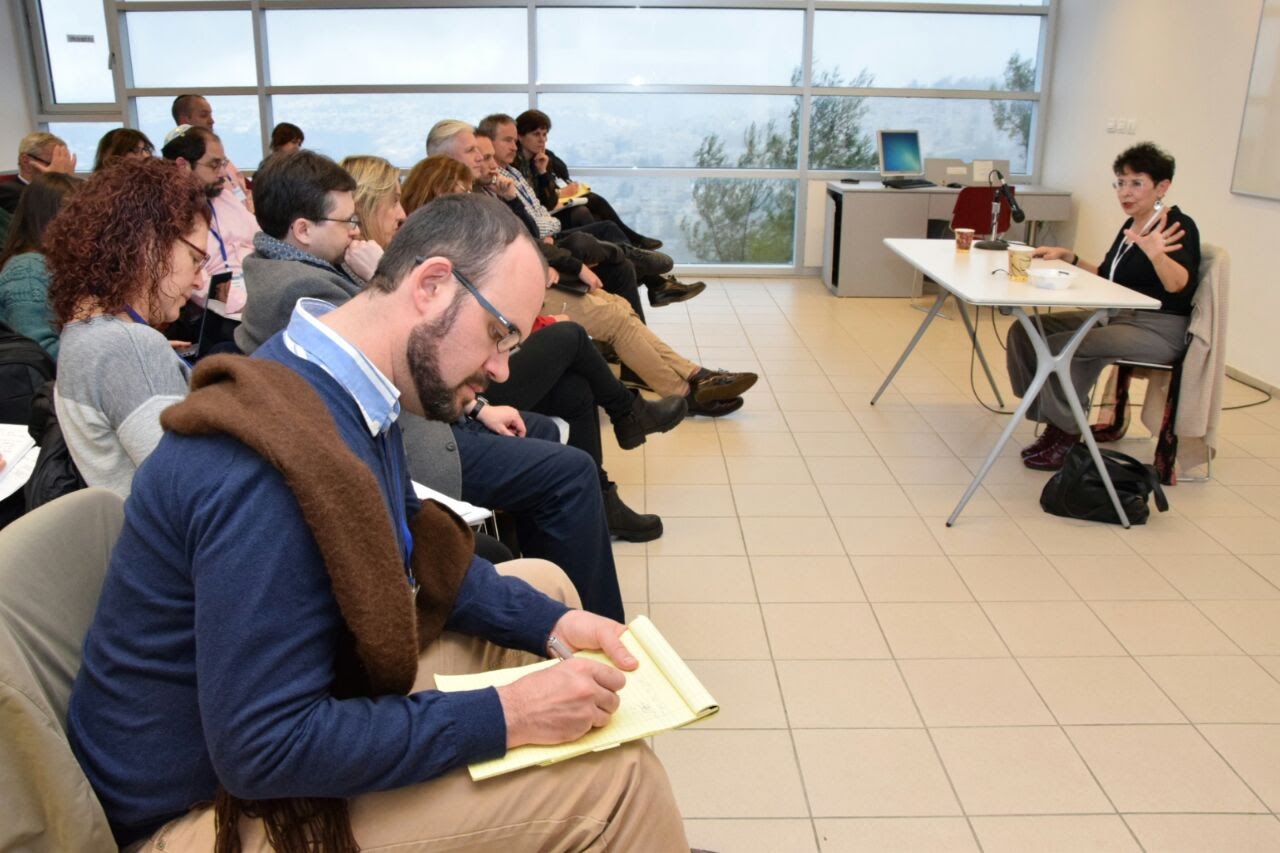Nonagenarian Holocaust expert Prof. Yehuda Bauer engages the audience of top-level Jewish educators with his presentation of the effects of the Shoah on Jewish identity
For more pictures click here
27 December 2016
The second day of the Jewish Educators' Conference investigating the Shoah and Jewish Identity kicked off with a Plenary Session held in Yad Vashem's state-of-the-art Edmond J. Safra Lecture Hall. Dr. Eyal Kaminka, Lily Safra Chair of Holocaust Education and Director of the International School for Holocaust Studies, gave the opening address in which he said that "our future is all about the choices we make here and now." Yad Vashem Academic Advisor Prof. Yehuda Bauer spoke about the effects of Jewish identity on communities and individuals during and after the Shoah: "It's not what you believe in, it's how you act," he declared. "In the end, words become tradition, and tradition becomes identity."
After a short break, Dr. Haim Gertner, Director of Yad Vashem's Archives Division and Fred Hillman Chair of Holocaust Documentation, talked about the "unearthing of the story" through the myriad artifacts and documents housed at Yad Vashem. "An artifact may encapsulate an entire life," he explained. "What may appear to be unimportant to one person may prove to be highly significant to another person."
Participants were then given the opportunity to hear a range of experts from Yad Vashem and other top educational institutions in Israel. In one session, Dr. Robert Rozett, Director of the Yad Vashem Libraries, presented the recently published anthology which he co-edited, After So Much Pain and Anguish: First Letters after Liberation. In his talk, he retold the moving story of American Jewish soldier Sammy Popush who was among the liberators of Dachau. In a letter to his family back in the US, Popush described the survivors' astonishment on finding out that he was Jewish, and that even more than their hunger for food, they were desperate to draw strength from his Jewish identity.
Later in the day, participants were privileged to meet and listen to Holocaust survivors from Hungary, Italy, Lithuania, Poland, Belarus and Greece. Yehudit Kleinman recalled her reticence to talk about her experiences until she became a mother, at which point she was "bursting to get my story out." Rena Quint, whose remarkable story of survival enthralled the audience, said: "I came out of the Holocaust a religious Jew despite not having any memory of coming from a religious background. I believe in God, I just don't understand everything."
"In the age of Instagram and social media networks, it is so important to maintain the authenticity of the Holocaust," commented Rabbi Naftali Schiff, Executive Director of JRoots, after the moving sessions. "Yad Vashem ensures that the Shoah remains relevant for all people."
The evening's proceedings began with the lighting of a menorah originating from Kiel, Germany. The menorah originally belonged to Rabbi Dr. Akiva Posner, who served from 1924–1933 as the last rabbi of the community before fleeing with his wife Rachel and their three children to Eretz Israel. Before their departure, Rabbi Posner was able to convince many of his congregants to leave as well, and most managed to reach Israel or the US. Over eighty years later, Yehuda Mansbach, grandson of Rabbi Akiva and Rachel Posner, was honored to light the menorah at Yad Vashem surrounded by his children and grandchildren.
Following the candle-lighting ceremony, Dr. Avraham (Alan) Rosen, friend and student of the late Holocaust survivor and Nobel Peace Laureate Elie Wiesel, gave a moving speech about his mentor's legacy. The evening concluded with a beautiful performance by the Ramat Gan Municipality Children’s Harmonica Orchestra.
The International Conference is generously supported by The Asper Foundation, the Adelson Family Foundation, the Conference on Jewish Material Claims Against Germany, Genesis Philanthropy Group and the Israel Ministry of Diaspora Affairs.








